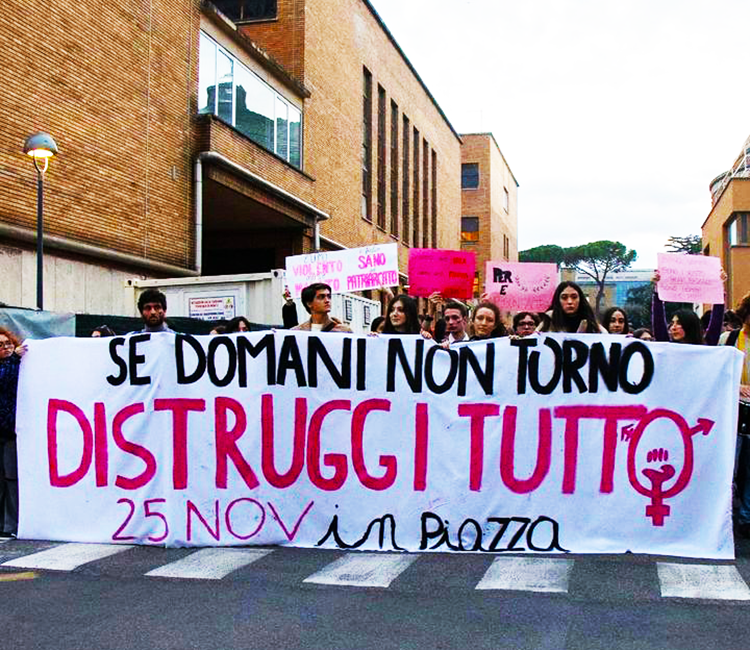“You don’t dedicate yourself enough to your offspring”
I’m a late feminist, and I still have a lot to study about historical feminism. I became a feminist in a very self-centered way, when I experienced firsthand the difficulties associated with being a woman , from sexist comments in the office to seeing male peers advance in their careers much faster than me, from the “problem” created by my pregnancy to the difficulty of returning to the professional context to follow, from the instillation of feelings of guilt because ” you don’t dedicate yourself enough to your children ” to the impossibility of aging peacefully, since, while a man becomes more fascinating with age, a woman ” it wears out”, “withers away”.

The “boy” and the “girl”
Up to a certain point, I didn’t need it. I became a feminist late, but luckily at a certain point I realized that I was living almost as an unwelcome guest in a world literally “on a human scale” and I started reading, reflecting and learning more. For this reason, today I developed the idea of wanting to contribute to showing people how necessary it is, still today, to fight for a more equal society. Not only for women, clearly, but for all those people who to date, due to some of their characteristics, have been considered second-class, and affected by epistemic injustice, that is, by the idea that they cannot be producers of knowledge: for this reason To be precise with the labels, I define myself as an intersectional transfeminist .
How many elements does female emancipation consist of? As far as I’m concerned, it passes through education, which is no coincidence denied to women for a long time, and consequently also through the words that are used towards my gender, and inevitably lands in work, paid and unpaid, and therefore in financial field. It is undoubtedly true that today, at least officially, women are not discriminated against: we are no longer considered biologically inferior, we have the opportunity to study any subject and undertake any career. However, discrimination remains, even if those who deny it can always appeal to the laws. And perhaps the problem is precisely this: the differences in treatment are hidden, not codified, but still present: in the mentality as well as in practice, in daily life. They exist, but they can be denied, because women vote, work and on paper have the same salary as men.
On paper, exactly. In reality, the construction of the niche in which a woman should be still begins before birth, from when the biological sex of the unborn child is known, on the basis of which the layette is prepared, the room is decorated, the bow is bought from hang on the door.
“You’re lucky if you’re with him who helps you ”
From birth, the ” sissy ” is taught to be more composed, to stay one step behind: modest, modest, never loud or foul-mouthed, she must avoid getting dirty and being a tomboy. Later, she is taught that the boy who teases her “is actually in love with you”, and perhaps she cultivates the dream of the “princess”.
The social expectation is that the girl studies, of course, but that she then finds a partner, gets married, possibly has children, and that she certainly does not prefer a career to motherhood, which in any case, well, remains one of the main roles of a woman.
It is also normal that, in addition to the children, the woman takes care of the house (a good husband or partner, if anything, helps her ) and the elderly members of the family. And that this is a real picture, not just a hagiography, is demonstrated by the data regarding jobs lost during the pandemic: the vast majority are women. On the one hand, because they often earn less than their partners (because, for example, having to dedicate themselves to care work, they don’t have the opportunity to work too much overtime); on the other, because when they closed RSAs and nurseries, it was natural that women took care of juniors and seniors even more .
Beyond talking about these issues, beyond denouncing them, even becoming pain in the ass, there are some specific topics that we have chosen to deal with in this edition of the Colloqui di Toscana, entitled “We Women”: the world of work and that of the economy. Two contexts considered to be male-dominated, and often analyzed from a purely male point of view. What would happen, however, to introduce more women into the working equation? It has been shown by various empirical studies that where variety and diversity increases , not only in the workforce, but also in top positions, the quality of the work itself benefits: women can bring extremely “out of the box” thinking. useful in a very competitive context like the current one. And therefore, apart from reeling off success stories, which risk remaining isolated cases in a context that is still strongly hostile to the presence of women, it is necessary to implement educational and work policies that also make it possible for women to have a career without sacrificing other aspects of their lives: because Unfortunately, even today, women in particular have to deal with a blanket that is too short, and keeping family and work together proves to be too great an effort for many of them.
Munus matris and munus patris
In addition to the work aspect, there is the economic one: I do not deny, as a woman, the attractiveness of the princess model: the idea of dedicating oneself to the offspring, leaving the man with the task of working and providing for the maintenance of the family (and therefore, marriage or munus matris , the ‘maternal task’, to the woman, heritage, or munus patris , ‘paternal task’, to the man, as the etymology tells us) has its charm; the problem is that it becomes difficult to get out of it if you change your mind at a certain point. Many women do not divorce because they are not financially independent, or because, when they realize that it would have made sense to enter the world of work or continue working, even if it apparently seemed the least attractive option at the time, they are out of the market or because of age or due to the lack of specific skills, and therefore they would be forced to accept low-paid jobs, which would not be able to guarantee their survival outside the couple.
I hope that opportunities like this can serve to make more and more people think about these issues, even if they may appear prosaic compared to others. But we need to remember that female emancipation also comes from money, and it’s time for women to talk about it shamelessly.
